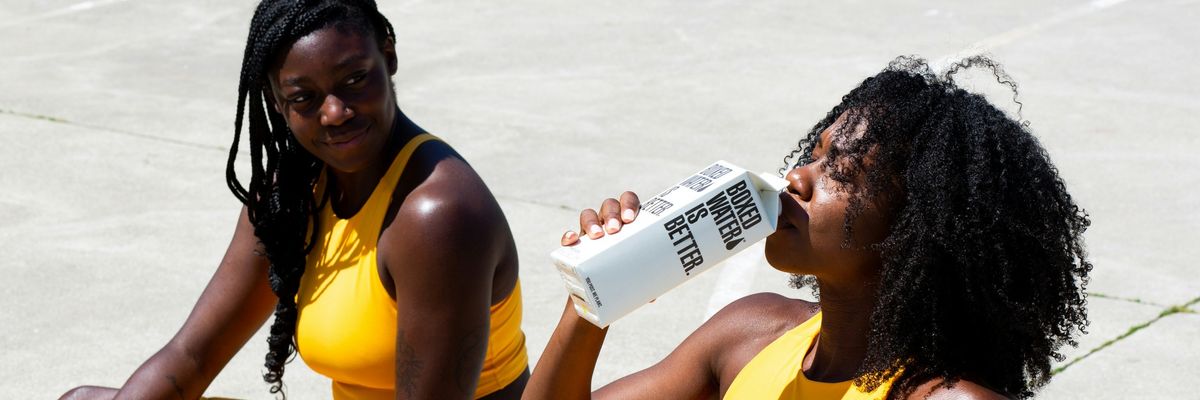Eunique Jones Gibson On Celebrating Black Culture While Creating Space For Black Joy

Growing up, Eunique Jones Gibson didn't have to look far for positive imagery that reflected who she was and where she came from. At a young age, Eunique's parents wasted no time instilling the importance of self-love and embracing the richness of Black culture. From her father's afrocentric, Cross Colours-based style to seeing herself through the lens of Lena James, Jada Pinkett's confident persona on A Different World, Eunique's surroundings began to paint a colorful portrait of the worlds that true representation could form. She points out, "That was my entryway into really embracing the culture and understanding the power of who we are and being critical of false narratives." It's no wonder that her work in representation through entertainment and media no less found her.
Early out in her career, the power to influence through advertisement served as a compass to direct her career pursuits, "When people used to ask me what I wanted to do that, I always said I wanted to influence decisions in 30 seconds or less. Because that's what commercials do." But for Eunique, the power to influence doesn't stop after the commercial ends, true impact transcends fleeting attention spans and viral moments that evaporate within the vapor of a swipe or click.
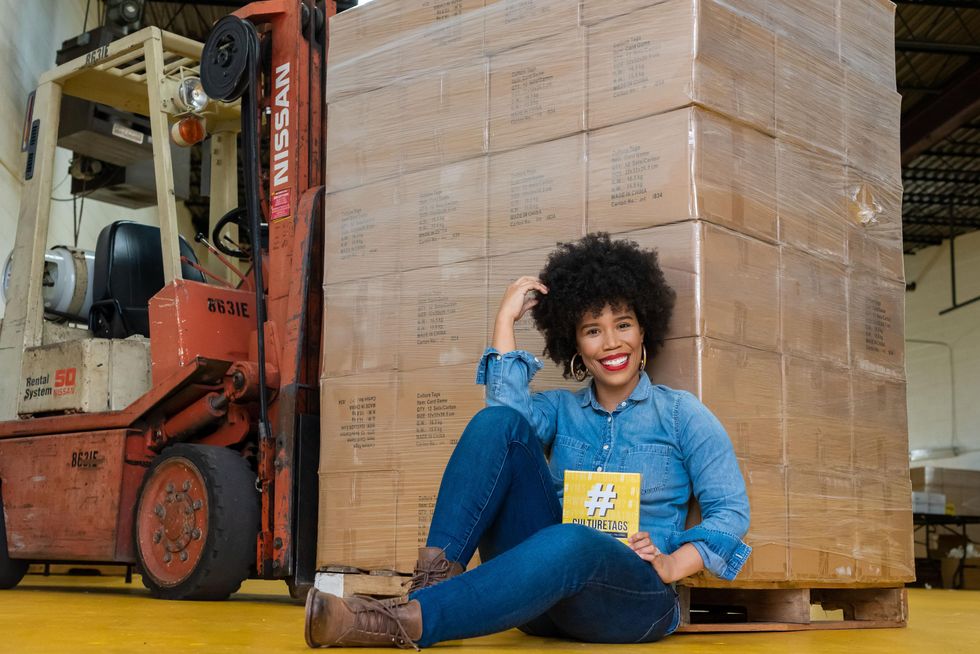
Photo by: Eunique Jones Gibson and Ashleigh Bing
The creative-entrepreneur proved this to be true, most noticeably through her Because of Them We Can campaign and instant-classic game, Culture Tags. In creating her Because of Them We Can campaign in 2013, Eunique recognized that Black History Month was in need of revitalization, "I wanted to refresh it, make it youthful, engaging, and inspiring. I saw the opportunity to do that through photographs and eventually to evolve it from that point." As the campaign grew in online popularity and potency, it garnered the attention of prominent figures like Oprah Winfrey to Kerry Washington, "I thought it was going to be a 28-day campaign, but I also realized that in order to be true to what I was trying to prove — which was that we need to reimage Black History, I had to lead by example."
The example that Eunique continues to set is one that's rooted in her mission to celebrate culture and community through the highest form of resistance: Black Joy. Her new game, Culture Tags, has served as an instrument for joy as many have looked for a delightful escape in the midst of quarantine. Restoring play and festivity back into our households, Culture Tags continues to find new life as outside reopens, guaranteeing to be the life of any cookout or rooftop party where the game makes an appearance. "As Black people, we've gone through and continue to go through so much as a community that oftentimes joy is all we have to look forward to. It's up to us to preserve it, protect it, and create the space for it."
xoNecole: Your project “Because Of Them We Can,” garnered viral success with the images that you shared of young Black children portraying notable Black figures. You mentioned once that you “wanted to refresh Black History,” could you tell us about that mission to refresh/reimagine Black History and how that’s evolved today?
Eunique Jones Gibson: When I started the campaign in 2013, I didn't see a captivating push that made Black History interesting and exciting and something that wasn't just Black and white photos. Black History was relegated to the narrative that in order to make history or be a figure or a person who could be acknowledged in Black History, it was a typical lineup of individuals that we learned about in school but it didn't expand beyond those individuals. It also typically ended up revolving around individuals who, when we talk about Black History Month, were older or people who were deceased and we know that Black History is constantly being made. It's always taking place, it's taking place right now as I'm talking to you.
I wanted to do something that would make it interesting to learn about figures throughout history that paved that way by refreshing those images and allowing folks to see them through the eyes of a child. Because then, you become a little more interested in the story and the individual beyond your bias or what you may think based on what you've heard or haven't heard.
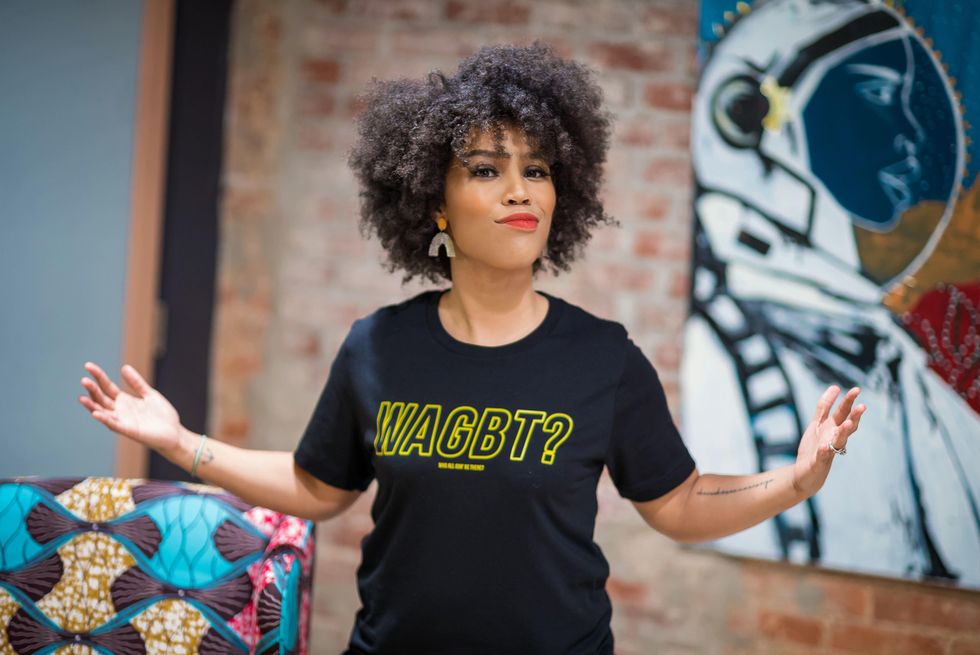
Photo by: Eunique Jones Gibson and Ashleigh Bing
Because of all the success that you did receive from that campaign, was there anything that surprised you about the feedback you received or the response in general from your community?
I think at the time what really surprised me was the fact that people wanted it to continue beyond Black History Month. It was almost as if it became my responsibility to keep it going. I had started something bigger than what I had initially thought it was. I thought it was going to be a 28-day campaign, but I also realized that in order to be true to what I was trying to prove, which was that we need to reimagine Black History, I had to lead by example. I don't think I expected it when I launched it and I certainly didn't expect to be eight years later to still be building upon that foundation.
Your game, Culture Tags, is one of the hottest new games for us. What inspired the creation of Culture Tags?
We are a big entertainment family; we love game nights and it really just dawned on me at some point that we needed more games! We needed more options that were rooted in our culture. Not games that we can play because we understand the rules and because they're fun, but games we can play because they bring back the nostalgia and excitement because we know that it was made with us in mind.
The inspiration behind Culture Tags is that same inspiration behind all of my work: it's to celebrate culture and community and to make sure we are represented. I started to think about it back in 2019. One day, I was online and saw a really long abbreviation or acronym and all these people were commenting, "Why do I know what this means?" I was definitely in that same group where I was like, "Yo, this is wild, I know what this says!" I've tried to train my mind to see the opportunities beyond what's on the surface, I immediately said, this is a game!
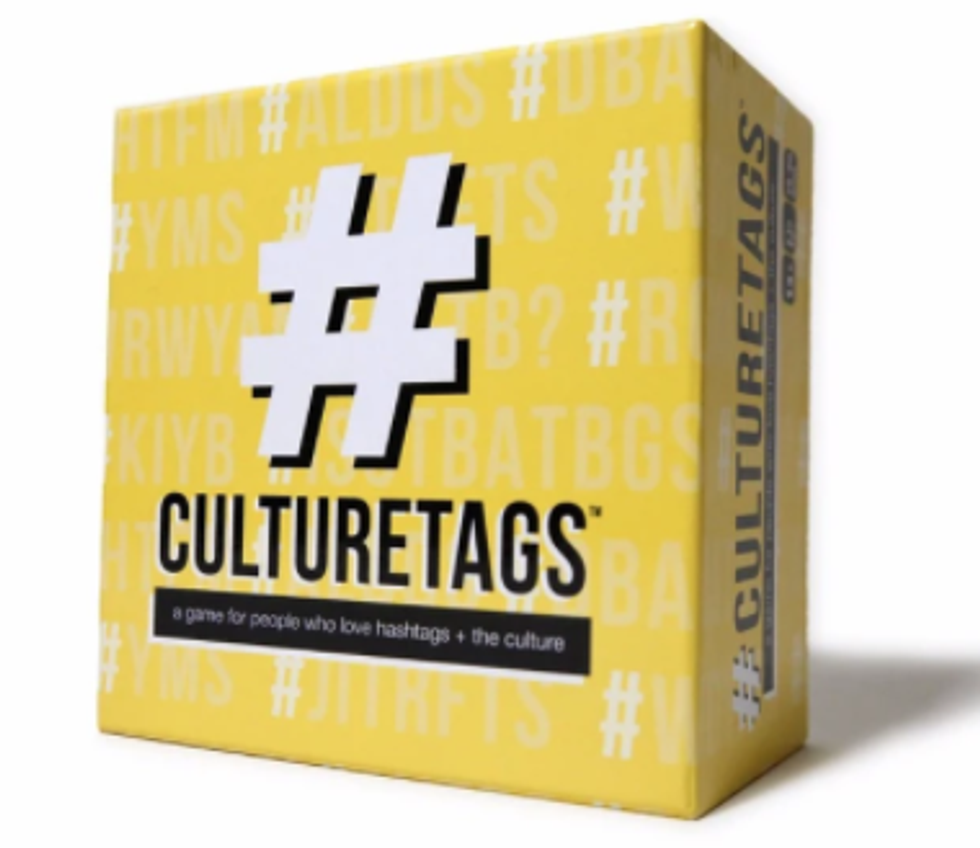
Courtesy of: Eunique Jones Gibson
Your agency, Culture Brands, has recently been tapped to become Hyundai’s African American agency of record. Why do you think it’s important for big brands to tap firms and agencies that are actually of the culture, especially when it comes to portraying our images in advertisements?
Because we exist. We live it, we eat it, we breathe it. It isn't something that we have to study, it's something that we innately know. In order for brands to portray an authentic representation of their customer base when they are targeting Black folks, they should have experts at the table who can present an authentic story and picture. You can't do that when you are not of the culture.
There are certain things that you will miss, certain things that you will overlook, and that will never enter the conversation because you don't have that first-hand knowledge. You have to bring in people who eat, sleep, and breathe it — and people who can respect it. It's one thing to create culturally relevant content but the content also has to be responsible; it can't be exploitative.
Someone who is of the culture should know how to ensure that we are represented without allowing a brand to co-op the culture or present themselves as a culture vulture. There has to be people at the table with a voice to guide in that direction. A lot of times you have people who are in the room but are not at the table or people who are at the table but don't have a voice, or if they have a voice, no one is listening. We have to make sure that when brands invite multicultural or African-American companies to the table, that they are ready to listen and learn and to implicate the learnings and expertise that these agencies are offering.
"It's one thing to create culturally relevant content but the content also has to be responsible; it can't be exploitative. Someone who is of the culture should know how to ensure that we are represented without allowing a brand to co-op the culture or present themselves as a culture vulture."
I was listening to your interview on Luuvie’s IG Live and one of the things that really resonated was when you shared, “You’ve got to trust your vision. People steal ideas all day, but you can not steal a vision.” In your eyes, what is the difference between an idea and a vision?
Ideas come and go, and oftentimes they are inspired by a need. They are inspired by the environment and things that are happening around us but I think that the difference between an idea and a vision is that a vision makes the idea scaleable. A vision makes the idea sustainable; and gives [the vision] value and validates it beyond that moment. And it gives you direction. It helps to guide the direction that you move in. Oftentimes your ideas may change, but they should back into your vision.
Beyond that, I also don't think it's a good idea to fall in love with your ideas. I think you can execute them and like them, but you should not fall in love with them. You should commit yourself to whatever your anticipated goal is: fall in love with the goal, not with the idea that might get you there because that idea can shift, but if you commit to the goal, you might see that there are multiple ways to get there. Which is why you have to anchor yourself in the vision.
"A lot of times you have people who are in the room but are not at the table or people who are at the table but don't have a voice, or if they have a voice, no one is listening."
Something that many creatives may experience along their journey is analysis paralysis in not really knowing where to start with their ideas. What advice would you give to someone who may be sitting on an idea or hesitant to take a leap into their dreams?
I always say, "Date your dreams." A lot of times you can look at an idea as a dream or something that you want to execute or explore and I think you have to date it and spend time with it. You have to obsess over it, analyze it from different angles, poke holes in it. What's good about this, what's bad about it? What makes sense, what makes this crazy? You date it.
I also think you have to be willing to bet on yourself. After you've gone through that process, if you've come out on the other side, you've got to be willing to fail. If you're not willing to fail, then you will never try. If you're willing to fail, then you can take the risk to move forward with the idea understanding that if you failed, you really just learned.
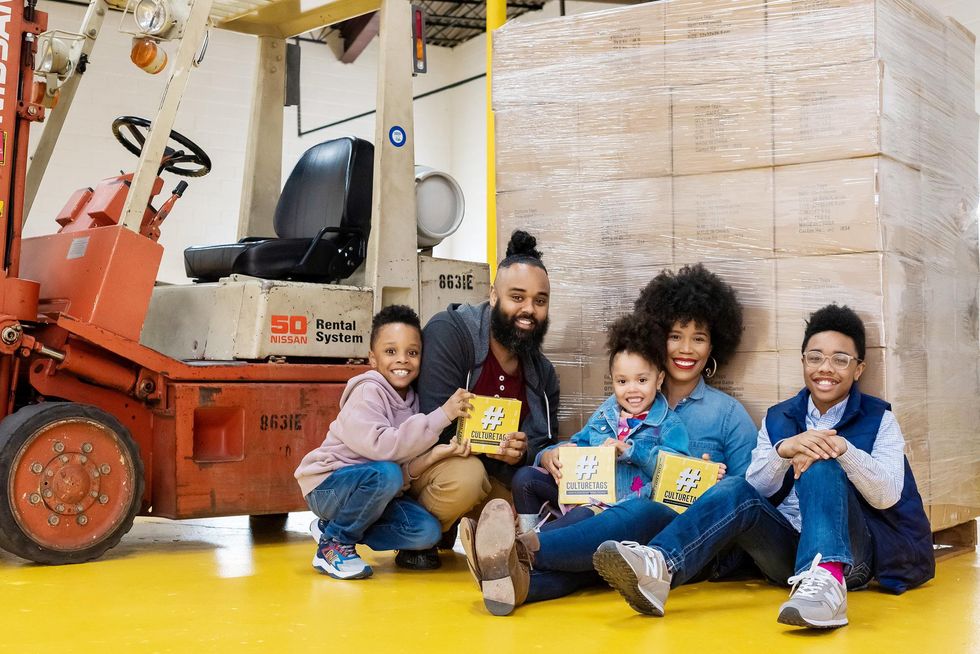
Photo by: Eunique Jones Gibson and Ashleigh Bing
"Mistakes happen for us to patch the holes, to ensure that our baskets stay full once the blessings start coming in."
What’s something that felt like a mistake in the moment, but turned out to be a pivotal lesson for you along your journey?
I've had multiple moments like that. My mentor tells me, sometimes the thing that feels horrible that we lament over because they happened to us, really happened for us. He likened it to medicine that tastes horrible but at the end of the day, it does us some good. I think it can only do us good if we maintain the perspective that it's all an opportunity to learn and improve and not make the same mistakes that we made before because we are more informed this time.
Failure has been a consistent part of my process and they have been big and small, and costly - whether it's cost me money or peace of mind, they are not inexpensive! But I have learned from each one of them to ensure that I do not make the same mistake again. Mistakes happen for us to patch the holes, to endure that our baskets stay full once the blessings start coming in.
For more of Eunique, follow her on Instagram.
Featured image courtesy of Eunique Jones Gibson
- Career Transition During a Pandemic - xoNecole: Women's Interest ... ›
- The Restorative Power Of Black Joy And Community - xoNecole: Lifestyle, Culture, Love, Wellness ›
This Is How To Keep 'Holiday Season Stress' From Infecting Your Relationship
Hmph. Maybe it’s just me, but it seems like there is something really weird happening in the fall season air (because winter doesn’t officially begin until December 21) that cuddle season is in full swing while break-up season is as well. In fact, did you know that break-ups are so popular during the holiday season that December 11 is deemed Break-Up Day?
The reasons why relationships shift around this time vary; however, I did both roll my eyes and chuckle when I read that a very popular one is because it’s an easy way to get out of getting one’s significant other a Christmas present. SMDH.
Anyway, I personally think that the less shallow folks out here may contemplate calling things “quits” or they at least distance themselves a bit from their partner (and what I’m referring to is serious relationships) due to all of the stress and strain that oftentimes comes with the holidays whether it be financial, familial, due to their tight schedules or something else.
Listen, I would hate for you and your man to miss the fun and happiness of experiencing this time of year, all because you are so overwhelmed or irritated that you can’t really enjoy it. That’s why I have a few practical tips for how to avoid allowing the typical holiday season stress from INFECTING your relationship.
Manage Your Expectations
 Giphy
GiphyUnmanaged expectations. If there is a main reason why the holiday season tends to be so stress-filled for so many people, I’d bet good money that this is the cause. And when you’re in a long-term relationship, expectations can manifest themselves in all sorts of cryptic and/or unexpected ways. You might have relatives who assume that you are going to be with them for Thanksgiving or Christmas when you have other plans in mind. You might be thinking that you are going to spend one amount for presents while your man is thinking something totally different. When it comes to scheduling, your signals may be crossed.
And you know what? To all of these scenarios, this is where clear and consistent communication come in. Don’t assume anything. Don’t dictate anything either. From now until New Year’s, mutually decide to check in once a week, just to make sure that you are both on the same page as it relates to the holidays and what you both are thinking will come along with it. The less blindsided you both feel, the less stressed out you will be. Trust me on this.
Set (and Keep) a Budget
 Giphy
GiphyOkay, so I read that last year, 36 percent of Americans incurred some type of holiday-related debt. Hmph. Last year, there was still some sense of normalcy in this country, chile, so I can only imagine what finances are gonna look like over the next several weeks. That said, since I don’t know a lot of people who don’t find being broke stressful, make sure that you and your bae set a budget and then stick to it this year — no ifs, ands or buts.
Because really, y’all — it doesn’t make sense to deplete savings and/or max out credit cards for a few days of giggles only to be damn near losing your mind because you don’t know how to make ends meet come Dr. Martin Luther King, Jr. Day.
And by the way, this tip doesn’t just speak to things like food and gifts; I also mean travel. If it doesn’t make a ton of sense (or cents) to be all over the place this year — DON’T BE.
Keep Matthew 5:37 at the Forefront
 Giphy
GiphyIf off the top of your head, you don’t know what Matthew 5:37 says, no worries, here ya go: “But let your ‘Yes’ be ‘Yes,’ and your ‘No,’ ‘No.’ For whatever is more than these is from the evil one.” That verse right there? Oh, it’s a boundaries lifesaver! I say that because do you see “maybe” or “I’ll think about it” in there? Nope. LOL. It says that you should tell people “yes” or “no” and leave it at that — and that complements Anne Lamott’s quote, “’No’ is a complete sentence” impeccably well. Yeah, you’ve got to remember that anything beyond a yes or no to a request is privileged information; you don’t owe anyone details or an explanation.
Besides, if you are really honest with yourself, when someone asks you something and you give a “Umm, let me think about it” kind of reply, more times than not, you already know what your answer is going to be — so why not let you both off of the hook? Give your response. Commit to that. And let everyone (including yourself) get on with their lives and schedules.
I promise you that when it comes to those holiday parties, you are pissing more folks off by not RSVP’ing or doing so and not showing up than just saying, “Thank you but not this year” off the rip.
Remember That Your Personal Space Is Privilege Not a Right
 Giphy
GiphyA friend of mine recently bought a new house and invited me over to come see it. He’s a single man with no children, so as I was taking in all of the space that he had, especially as I walked through his finished basement, I joked about relatives coming to live with him. “Hell no” and “absolutely not” were pretty much his immediate responses as he went on to say that some folks even had the nerve to be offended when he told them that he had no intentions on taking DNA in.
Ain’t it wild how people think that your stuff is their right? And yes, that brings me to my next point. Your home is your sanctuary space. If you want to host folks this year — cool. If not, ALSO COOL. Please don’t let folks (family included) guilt you into how they want you to act or even into what they would do if the shoe was on the other foot. You are not them — and as one of my favorite quotes states, “If two people were exactly alike, one of them would be unnecessary.” (A man by the name Larry Dixon said that.)
Hell, my friends? They know that I am good for sending them random things that they need or even want all throughout the year. Coming over to hang out at my pace, though. Uh-uh. Chalk it up to being a card-carrying member of the ambivert club yet I like keeping my living space personal — and I sleep like a baby, each and every night, for feeling that way.
Always remember that your space, your time, your resources, your energy and shoot, yourself period (including your relationship), are all things that are your own. You get to choose how, when and why you want to share them. The holiday season is certainly no exception.
Cultivate Some “You Two Only” Traditions
 Giphy
GiphyIt’s not uncommon for some couples to hit me up after the holiday season to “detox.” Sometimes it’s due to the financial drama (and sometimes trauma) that they experienced. Sometimes it’s because they allowed their relatives (especially in-laws) to get more into their personal business than they should’ve. More than anything, though, it tends to be because they didn’t get enough quality time together and so ended up feeling “disconnected.”
Please don’t let that happen. Listen, I’m not even a holidays kind of woman and yet, I will absolutely sit myself down with some hot chocolate and chocolate chip cookies to enjoy a Hallmark holiday film or two. Aside from the fact that most of them are lighthearted and sweet, I also like that they usually focus on couples loving on each other amidst all of the holiday beauty and ambiance — which is something that all couples should set aside some time to do.
Maybe it’s a vacation. Maybe it’s a staycation. Or maybe it’s my personal favorite, A SEXCATION. Whether it’s for a few days, the weekend or even overnight — don’t you let the holidays go by without setting aside time for you and your man to celebrate one another. Don’t you dare (check out “Are You Ready To Have Some Very Merry 'Christmas Sex'?”).
GET. SOME. REST.
 Giphy
GiphyI once read that 8 out of 10 people get stressed out over the holidays and 3 out of 10 lose sleep during to it — and when you’re stress-filled and sleep-deprived, that can absolutely lead to hypersensitivity, making mountains out of molehills and even not being in the mood for sex.
Your relationship can’t afford to go through any of this, so definitely make sure to prioritize rest. I don’t care how unrealistic it might seem during this time, sleep should never be seen as a luxury; it will always and forever be a great necessity.
That said, try to get no less than six hours of shut-eye in (check out “6 Fascinating Ways Sex And Sleep Definitely Go Hand In Hand”) and even ask your bae to take a nap with you sometimes (check out “Wanna Have Some Next-Level Sex? Take A Nap, Sis.”). Not only will sleep help to restore your mind, body and spirit but, when it’s with your partner, it’s an act of intimacy that can make you both feel super connected, even in the midst of what might feel like chaos.
___
Holiday season stress is real. Still, never give it the permission or power to throw your relationship off. Put you and your man first and let the holidays be what they are gonna be, chile.
Let’s make things inbox official! Sign up for the xoNecole newsletter for love, wellness, career, and exclusive content delivered straight to your inbox.
Featured image by Shutterstock
I wish I enjoyed drinking plain ole’ water. I don’t, though, and, at this point, I doubt that I ever will. It’s not something that I’m proud of or anything, but like I’ve said in other articles on this platform, to me, water is so damn boring; it’s literally like drinking “wet air.”
That doesn’t mean I don’t accept that it’s a “necessary evil” being that we all are made up of so much water and being dehydrated (which is something that a lot of us are) can cause so many health-related issues, including blurred vision, muscle cramps, dried skin, fatigue and even moodiness.
That’s why, over the years, I’ve been intentional about figuring out ways to get more agua into my body without feeling like it’s a chore or something to dread. And now, I want to pass some of those hacks on to you, just in case you happen to totally relate to where I am coming from.
If something that you want to do more of right through here is get extra H2O into your system, here are 10 tips that can absolutely help to make that possible.
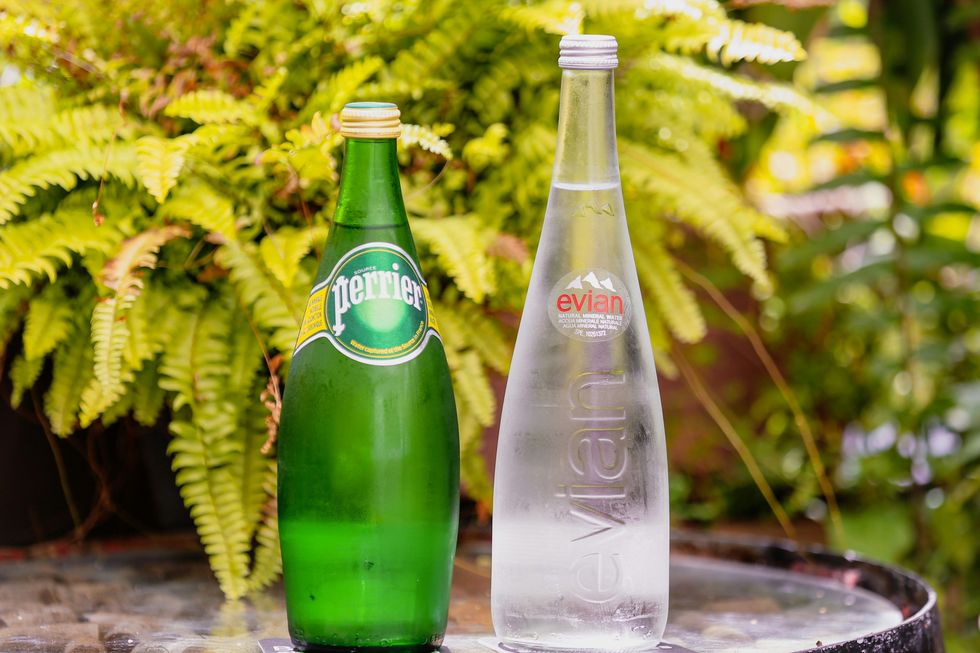
Unsplash
1. Invest in a Fun Water Bottle
There’s a far greater chance that you are going to drink water if you have a water bottle around you. So, cop yourself a cute one — one that will help you to stay motivated. A tumbler that I purchased some time back, just because I thought it was cute as hell, simply says, “Make Better Coochie Decisions” (amen?-LOL). Honestly, that doesn’t just have to apply to sex but how you treat your vagina overall — and that includes making sure that “she” has all of the fluids that she needs.
2. Try Some Sparkling Water or Mineral Water
At this point, I should take stock in Waterloo. It currently is my favorite kind of sparkling water and it has definitely made getting more water into my system easier to do. That’s because I will add some limes to it or a bit of fruit juice to it and that makes drinking water less “meh” for me. Another type of water that has bubbles in it is sparkling mineral water; it can also be beneficial since it contains magnesium, potassium and calcium.

Unsplash
3. Go Halfsies with Your Other Drinks of Choice
Speaking of making some all-natural soda (which is basically what happens when you add juice to sparkling water or sparkling mineral water), you can find yourself drinking more water while consuming less calories if you fill up your glass with half of your favorite fruit juice and half of some sparkling water. More times than not, the juice doesn’t even taste watered down. Try it before you doubt me.
4. Collect Some Infused Water Recipes
I’m forever gonna be a fan of infused water; that’s because it’s water that has fresh fruits and/or veggies in them — and it doesn’t get any healthier than that. Plus, infused water tends to take on the taste of whatever fruits or vegetables that you put into the water (if you let the stuff soak for a couple of hours), so that the water doesn’t taste so boring and bland. Wanna try a few recipes? You can check out some here and here.

Unsplash
5. Make Slushies Instead of Smoothies
Are you someone who enjoys consuming smoothies? Well, if you want to get more water into your system, how about going with a slushie instead? Although it is true that some smoothies have water as a base, the most bomb ones use milk (or a milk alternative) or yogurt. Slushies, on the other hand, typically go with crushed ice (which is frozen water) instead. That said, some (pardon the pun) cool slushy recipes can be found here, here and here.
6. Use Water As Your “Drink Chaser”
Another great thing about water is it can help to keep you from overeating; it does that by causing you to feel full if you drink it while you are eating. And speaking of calorie-counting, if you don’t want to give up your favorite drink at mealtime, one way to keep from downing 2-3 glasses of it at a time is to use water as your “chaser.” What I mean by that is, after enjoying a glass of your favorite beverage, “chase it down” with a glass of water. That should satisfy your want for what you want without overdoing it.

Unsplash
7. Eat Foods That Are High in Water Content
Another way to get more water into your body is to eat foods that have a ton of water in them. Some that top the list include lettuce (96 percent); cucumber (95 percent); zucchini (95 percent); celery (95 percent); strawberries (91 percent); cantaloupe (90 percent), and peaches (89 percent).
8. Have a Ball with Your Ice Cubes
Ice cubes are frozen water, right? That’s why most of us prefer to enjoy our drinks before the ice cubes melt because melted cubes water down whatever it is that we are consuming. And so, for this very reason, add more ice cubes to your drinks — and have fun making them. You can add juice, fruit and/or mint leaves while making your cubes. That way, they are aesthetically-pleasing; plus, they will also add more flavor to your water once the ice cubes actually melt.

Unsplash
9. Add Some Non-Alcohol Cordial to Your Water
If you’re fine with just having a tad of taste in your water, why not add a bit of cordial to it? Cordial is simply a type of tonic, syrup or sweetener (that can contain alcohol or not) that can help to make your water more…interesting. Some alcohol-based cordials can be found here. Some non-alcoholic recipes are located here.
10. Technically, Herbal Tea Counts
Tea is always gonna be my thing. That’s why I’ve penned articles on it for the site like “10 Different Ways Herbal Teas Can Fit Into Your Beauty Regimen”, “10 'Uncommon' Teas You Should Add To Your Stash (& Why)” and “I've Got 10 Teas That Will Help You To Age (Even More) Gracefully” And y’all, if you want to get a lot more water into your system yet a tall glass of water only isn’t your — pardon the pun — cup of tea, make some iced herbal tea instead.
It’s basically water with some herbs tossed in and, if you add some honey or raw organic coconut palm sugar to it, it will be a really sweet treat that will still be extremely hydrating (and very healthy) for you.
Water that is a bit more exciting for you…now. LOL.
Drink up!
Let’s make things inbox official! Sign up for the xoNecole newsletter for love, wellness, career, and exclusive content delivered straight to your inbox.
Featured image by Unsplash







